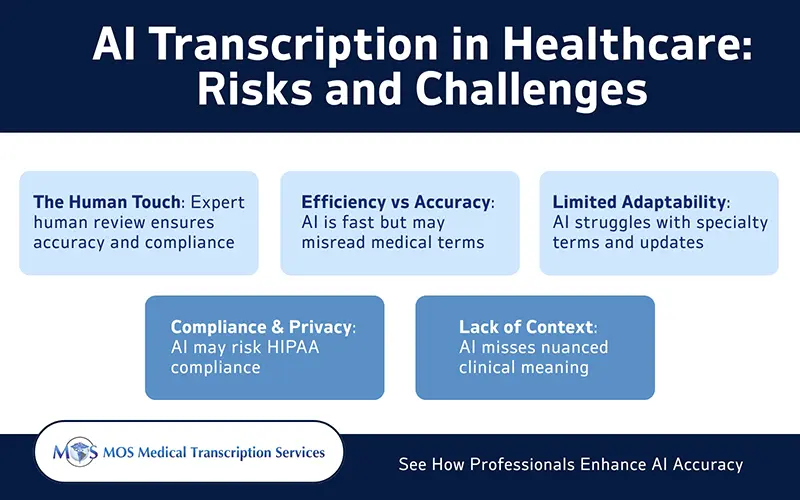
Table of Contents
The emergence of artificial intelligence (AI) in healthcare is a significant advancement towards enhancing efficiency, increasing productivity, and improving patient outcomes. In clinical documentation, AI-driven medical transcription plays a vital role in helping physicians find more time to focus on patient care than paperwork. AI systems are well-trained to decipher, interpret, and summarize spoken medical interactions, driving faster generation of clinical reports and discharge summaries, and reducing administrative workload.
However, even with its many advantages, the challenges of using AI in medical transcription present significant obstacles that affect accuracy, reliability, and patient safety. Speed alone cannot guarantee precision, as even the most advanced algorithms can misinterpret medical terminology, accents, or speech patterns, leading to errors in medical records. Such limitations make it clear that AI, while powerful, cannot replace the nuanced judgment of trained medical professionals. Since maintaining an in-house AI-driven transcription team is resource-intensive, practices can utilize medical transcription services to streamline workflows and ensure timely, error-free documentation.
Top Challenges of Using AI in Medical Transcription
Given below are the key challenges of AI-driven transcription tools:
- Medical Record Accuracy Gaps: Medical professionals use complex jargon, specialty-specific technical terms, and abbreviations that require deep understanding of terminology and context. However, even the most sophisticated AI-driven clinical transcription tools can struggle with the intricacies of medical language. Mistakes may also arise if AI models fail to transcribe diverse accents, dialects, or multiple speakers accurately, increasing the risk of errors or omissions. For example, a physician dictating ‘hyperthyroidism’ could be recorded incorrectly as ‘hypothyroidism’, leading to confusion in diagnosis or care plans.
- Contextual Misunderstanding and Structure Issues: Beyond terminology, AI often struggles with the context in which medical information is conveyed. Differentiating between patient symptoms, medical history, and treatment plans requires nuanced understanding that AI alone may not fully grasp. Clinical notes rely on structured and consistent formatting conventions, such as chronological order, section labels, and tabular data. AI may fail to apply these conventions consistently, leading to misplaced punctuation, missing sections, or incorrect structuring that can compromise clarity and usability. A 2025 study published in Journal of Clinical Gastroenterology underscores the importance of human oversight in AI-assisted medical transcription. The research found that AI systems misclassified relevant dietary conversations as trivial. Such misclassifications and inaccuracies highlight the role of professional transcriptionists in ensuring the quality of the documentation, which directly impacts patient care.
- Electronic Health Record (EHR) Integration Complexity: Implementing AI-powered transcription is rarely a plug and play solution as healthcare facilities operate on various EHR platforms, including legacy systems. Integrating AI tools with existing EHRs can be technically complex as issues such as data compatibility, system downtime, and workflow adjustments can slow adoption. Staff may also require proper training to use AI effectively, increasing initial costs and time investment. Without careful planning, the transition to AI-driven transcription can disrupt operations rather than streamline them.
- Delayed Billing Cycles: While AI can accelerate documentation, medical transcription errors or misinterpretations can create delays and increase administrative overhead in the billing process. Inaccurate records may need lengthy manual verification or corrections before claims can be processed. This is especially required in complex cases where even minor errors such as incorrect patient demographic detail can trigger claim denials or rejections. Healthcare organizations relying solely on AI without adequate human review may find that the time saved in transcription is offset by delays in revenue cycle processes.
- Data Privacy and Security Concerns: Patient data is among the most sensitive information handled in any industry, and AI-based transcription systems increase the risk of data breach and cyberattacks, if not handled securely. AI transcription solutions must comply with HIPAA and other regulatory standards to protect confidentiality. Key risks include unauthorized access, insecure storage of audio files, or interception during transmission. Even minor lapses can lead to data breaches, legal penalties, and loss of patient trust. Healthcare providers must implement encryption, access controls, and secure cloud storage to comply with patient privacy regulations and safeguard patient information while using AI transcription systems.
- Training Complications and Over-Reliance on Automation: AI algorithms require continuous learning and access to the latest accurate data to remain effective. New medical terminology, evolving treatment protocols, or coding updates can challenge an AI model if it is not regularly updated. Over-reliance on AI also risks diminishing human oversight, leading to unchecked errors. Maintaining balance between automation and professional review is essential – AI should assist healthcare providers, not replace their judgment. Staff should be trained to validate AI outputs and intervene when necessary.
Address AI Challenges: Rely on Professional Medical Transcription Support
While AI-driven transcription offers speed and efficiency, the challenges outlined above demonstrate that relying solely on technology can compromise accuracy, context, and compliance. Outsourcing medical transcription to professional service providers bridges these gaps, combining human expertise with AI assistance to ensure high-quality documentation. Key benefits of outsourcing include:
- Enhanced Accuracy: Professional transcriptionists review AI-generated transcripts, correcting errors in medical terminology, abbreviations, and multiple-speaker conversations. This ensures that clinical records are precise and reliable, ultimately supporting better patient care.
- Improved Contextual Understanding: Human experts bring contextual understanding to each transcript, ensuring intent, tone, and critical clinical information are accurately represented. Human quality checks keep formatting consistent, maintain logical flow, and ensure proper sectioning. Outsourced teams can also tailor formatting to specific departmental or regulatory standards, enhancing usability for physicians and administrative staff alike.
- Faster and More Accurate Billing: By combining AI speed with human verification, outsourced services reduce errors that could delay claims processing. This accelerates revenue cycles while minimizing administrative overhead and claim rejections.
- Stronger Data Privacy and Security Measures: Established transcription providers implement strict security protocols, including encryption, secure storage, and controlled access. This ensures patient data remains protected, reducing risks of data breaches and regulatory penalties from non-compliance.
- Continuous Training: Outsourced teams receive ongoing training in current medical terminology, coding updates, and AI advancements. This proactive approach safeguards efficiency and oversight, ensuring consistently high transcription quality.
By outsourcing medical transcription, healthcare organizations can leverage the speed of AI while ensuring accuracy, security, and compliance, ultimately creating a more reliable and efficient documentation process.
